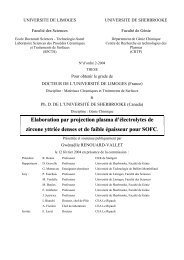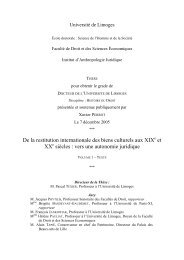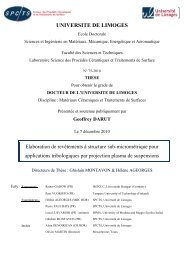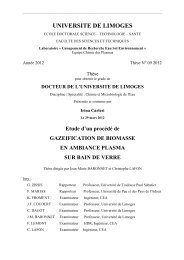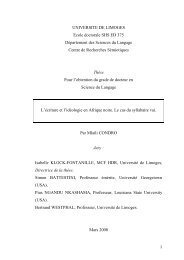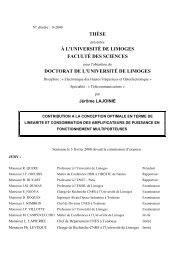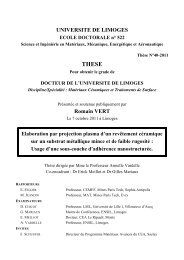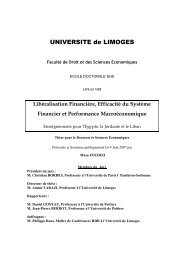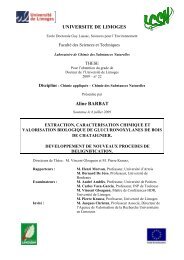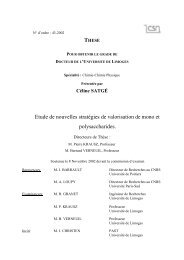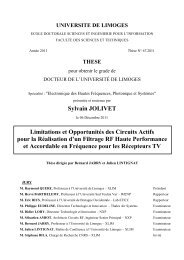- Page 1 and 2: N° UNIVERSITE DE LIMOGES Ecole Doc
- Page 3 and 4: REMERCIEMENTS A : Monsieur Jean-Mar
- Page 5 and 6: CORPUS 1 Centrafrique Etienne Goyé
- Page 7 and 8: Congo-Brazzaville Sony Labou Tansi,
- Page 9 and 10: Côte d’Ivoire Ahmadou Kourouma,
- Page 11 and 12: qu’il n’y aura pas de changemen
- Page 13 and 14: Guinée-Conakry Tierno Monénembo,
- Page 15 and 16: Njoroge, ouvrier agricole, raconte
- Page 17 and 18: hasard. On les retrouve dans des sa
- Page 19 and 20: INTRODUCTION « Le lien qui peut un
- Page 21 and 22: oman africain où l’on découvre
- Page 23 and 24: En Afrique subsaharienne tout se pa
- Page 25 and 26: part des écrivains africains, et d
- Page 27 and 28: l’espace et du temps dans l’ét
- Page 29 and 30: identifier une société que par ra
- Page 31 and 32: Les Soleils des Indépendances 44 L
- Page 33 and 34: millénaires va s’effondrer et vo
- Page 35 and 36: dimension plus abstraite du discour
- Page 37 and 38: Les études sur le roman africain s
- Page 39 and 40: PREMIERE PARTIE TYPOLOGIE DE L’ES
- Page 41 and 42: d'Okonkwo sont distinctement indiqu
- Page 43 and 44: poulets regagnent leur perchoir. De
- Page 45 and 46: they said. » 85 Bien qu'il n'y ait
- Page 47 and 48: grec : éros, agapè et philia, pre
- Page 49: Cette fable qu’Ezinma connaît pa
- Page 53 and 54: Par cet acte, ils permettent l’in
- Page 55 and 56: dominait une plaine à perte de vue
- Page 57 and 58: A l’époque coloniale, sur le che
- Page 59 and 60: souligné Thomas Melone dans Chinua
- Page 61 and 62: Maman Nationale. » 122 Et quand la
- Page 63 and 64: « Cette feuille, tu mets sous ta l
- Page 65 and 66: entiers, voire des semaines, en viv
- Page 67 and 68: etour dans son clan est malheureuse
- Page 69 and 70: l’implantation définitive de l
- Page 71 and 72: ceux qui doivent perpétuer les rit
- Page 73 and 74: promiscuité et le bestiaire s’al
- Page 75 and 76: ien. » 152 Eu égard à ce que nou
- Page 77 and 78: des personnages qui tentent désesp
- Page 79 and 80: centripète. Ainsi, la ville à tra
- Page 81 and 82: emarque que dans l’œuvre de Zola
- Page 83 and 84: s’expliquent de manière décisiv
- Page 85 and 86: font une gymnastique compliquée po
- Page 87 and 88: l’ensemble de se disloquer. » 17
- Page 89 and 90: nauséabonds. L’imagerie de l’u
- Page 91 and 92: par : « chaumière », « cabane
- Page 93 and 94: usque. » 188 L’espace domestique
- Page 95 and 96: Gilles Deleuze affirme que « l’a
- Page 97 and 98: fabrication locale. La structure sy
- Page 99 and 100: Three. Abrupt drop, this. So many d
- Page 101 and 102:
amers. La jeunesse augmentait en po
- Page 103 and 104:
leur corps à la portée de tous le
- Page 105 and 106:
aconter tout haut les souvenirs de
- Page 107 and 108:
CHAPITRE III : L’ESPACE VALORISE
- Page 109 and 110:
salut et de la paix, rue Gaza, avec
- Page 111 and 112:
men in the bungalows did not even w
- Page 113 and 114:
particulier, il déshabille tout le
- Page 115 and 116:
Cet étalage ostentatoire et l’ex
- Page 117 and 118:
princes et les nouveaux riches et d
- Page 119 and 120:
quant à lui met la volonté du ren
- Page 121 and 122:
CHAPITRE IV : LE CENTRE ADMINISTRAT
- Page 123 and 124:
[…]. Il s’ensuit qu’écrire s
- Page 125 and 126:
Que ce soit la politique coloniale
- Page 127 and 128:
l’angoisse de cet espace, symbole
- Page 129 and 130:
La plongée de l’analyse d’un e
- Page 131 and 132:
accomplished a downward stroke. The
- Page 133 and 134:
construction de la bourse de Brazza
- Page 135 and 136:
« La pièce qui lui sert d’antic
- Page 137 and 138:
Jean-François Médard, nous reteno
- Page 139 and 140:
Nkashama remarque que « le marché
- Page 141 and 142:
ville dans le roman africain 279 un
- Page 143 and 144:
traditionnels a entraîné non seul
- Page 145 and 146:
the things he could buy. » 288 Ce
- Page 147 and 148:
grouillements, vacarmes et mille é
- Page 149 and 150:
qu’elle n’eût poussé trois cr
- Page 151 and 152:
la définit comme « l’espace tot
- Page 153 and 154:
classe d’adultes ou à des gens q
- Page 155 and 156:
soumit à la torture. On lui dit al
- Page 157 and 158:
Dans les œuvres qui vont servir de
- Page 159 and 160:
Chef d’Etat avant tout bulletin d
- Page 161 and 162:
ancestral. Dans les hymnes que l’
- Page 163 and 164:
de ce roman signale l’apparition
- Page 165 and 166:
ouffonnerie ou ubuesque. Mais il n
- Page 167 and 168:
s’acheminer vers lui. Le parcours
- Page 169 and 170:
de Fama renforce les caractères é
- Page 171 and 172:
émergeaient des crocodiles géants
- Page 173 and 174:
entrent dans la structure de « cau
- Page 175 and 176:
idonvilles croissent au gré des ar
- Page 177 and 178:
CHAPITRE V : RUPTURES DANS LA REPRE
- Page 179 and 180:
les religions des hommes de toutes
- Page 181 and 182:
oraux, elle participe à la modific
- Page 183 and 184:
eligieuses qui influent sur la vie
- Page 185 and 186:
« Every village had its own ilo wh
- Page 187 and 188:
« The way into the shrine was a ro
- Page 189 and 190:
faute très grave comme le crime da
- Page 191 and 192:
ordinaires - comme le dit le person
- Page 193 and 194:
« L’arrivée au champ de l’exc
- Page 195 and 196:
chrétiens furent placés, d’embl
- Page 197 and 198:
the white man’s fetish had unbeli
- Page 199 and 200:
ien d’idolâtrie comme le pense l
- Page 201 and 202:
of the goddess had been done, he sa
- Page 203 and 204:
des Dieux resta illimité et des g
- Page 205 and 206:
Biyaoula auteur de L’Impasse. Et
- Page 207 and 208:
nouveau converti ne peut donc que m
- Page 209 and 210:
incarne l’autorité et la douceur
- Page 211 and 212:
s’affolèrent » 417. L’attitud
- Page 213 and 214:
accompagné de Diké qui venge les
- Page 215 and 216:
faire apparaître le portrait d’u
- Page 217 and 218:
onction, le baptême apparaissent m
- Page 219 and 220:
sixa 434 qui a été victime de ces
- Page 221 and 222:
yeux de Toundi, dans un processus d
- Page 223 and 224:
ambiguïté la dépersonnalisation
- Page 225 and 226:
traditionnelle à celles de la reli
- Page 227 and 228:
let us try gidigbo ∗ , and Christ
- Page 229 and 230:
fortement liés à la psychologie d
- Page 231 and 232:
l’important brassage des croyance
- Page 233 and 234:
CHAPITRE VI : L’ISLAM EN AFRIQUE
- Page 235 and 236:
de la terre". » 459 A l’exceptio
- Page 237 and 238:
simples. En Israël, tant le père
- Page 239 and 240:
Comme le montre la lecture de nombr
- Page 241 and 242:
Dieu. Son mode de vie et ses relati
- Page 243 and 244:
La préférence est accordée dans
- Page 245 and 246:
chez la Royale. Mais il n’y épro
- Page 247 and 248:
VI.3. L’Islam et le terrain afric
- Page 249 and 250:
especté. C’est le seul lieu qui
- Page 251 and 252:
« Un dernier mot, Diouldé. Si tu
- Page 253 and 254:
signes sur sable fin (évocation de
- Page 255 and 256:
les marabouts se sont largement tro
- Page 257 and 258:
mosquée […]. Toujours fiévreuse
- Page 259 and 260:
En établissant un parallèle entre
- Page 261 and 262:
CHAPITRE VII : LES IMAGES DE LA PRO
- Page 263 and 264:
Cette présentation objective fait
- Page 265 and 266:
VII.1. La terre L’objectif de ce
- Page 267 and 268:
La déesse de la terre Ani est hono
- Page 269 and 270:
glorification. En dernier ressort,
- Page 271 and 272:
acquis et que rien au monde ne pour
- Page 273 and 274:
La suite du récit du mythe kikuyu
- Page 275 and 276:
des ancêtres. Il n’a donc pas pu
- Page 277 and 278:
de violence, baignée d’incertitu
- Page 279 and 280:
VII.2. La pluie La pluie est l’é
- Page 281 and 282:
jeune Egbo les secrets de la vie. I
- Page 283 and 284:
peu plus tard, cette pluie moins ab
- Page 285 and 286:
malpropre, gluante et sale : « La
- Page 287 and 288:
d’enterrer, car nous avions peur
- Page 289 and 290:
tradition » 579 : tel est le cas d
- Page 291 and 292:
« Le soleil chauffait à blanc, no
- Page 293 and 294:
CHAPITRE VIII : DE LA GEOMETRIE DU
- Page 295 and 296:
Mais le cercle dans Things Fall Apa
- Page 297 and 298:
efore him. The had something to say
- Page 299 and 300:
and half-brothers had been dancing
- Page 301 and 302:
l’individualisation empirique et
- Page 303 and 304:
socio-historique, apparaissant comm
- Page 305 and 306:
pour la plupart du temps en vase cl
- Page 307 and 308:
Les figures antithétiques, les aux
- Page 309 and 310:
[comme]) utilisés dans la narratio
- Page 311 and 312:
« The District Commissioner spoke
- Page 313 and 314:
VIII.2. La géométrie du cercle da
- Page 315 and 316:
Grâce aux sacrifices tués par nos
- Page 317 and 318:
par une arrestation injustifiée, F
- Page 319 and 320:
aperçut un caïman sacré fonçant
- Page 321 and 322:
main levée les nouvelles dimension
- Page 323 and 324:
ancienne colonie britannique, au se
- Page 325 and 326:
pour la lecture de l’œuvre de So
- Page 327 and 328:
l’entend non seulement au sein de
- Page 329 and 330:
qui aurait subi de nombreux changem
- Page 331 and 332:
dernier personnage mentionné, son
- Page 333 and 334:
Sud, le Messie-koï avait assis les
- Page 335 and 336:
Cela dit, les choses sérieuses com
- Page 337 and 338:
par leur système de gouvernement,
- Page 339 and 340:
« A ce moment, monsieur le ministr
- Page 341 and 342:
Labou Tansi et Le transport de A.H.
- Page 343 and 344:
construction dont l’installation
- Page 345 and 346:
épublique des Marigots du Sud. L
- Page 347 and 348:
une nouvelle civilisation ne sont p
- Page 349 and 350:
XIX.1. L’Europe, l’espace de d
- Page 351 and 352:
même de la cité de l’homme, une
- Page 353 and 354:
l’espace par Samba Diallo, il se
- Page 355 and 356:
« Il me semble qu’au pays des Di
- Page 357 and 358:
dans son itinéraire un appât séd
- Page 359 and 360:
s’imposent. L’aventure de Camil
- Page 361 and 362:
excitant […]. Il y avait votre co
- Page 363 and 364:
ainsi des traits sémiques de manqu
- Page 365 and 366:
son pays d’origine que par les bo
- Page 367 and 368:
communautés pour les ériger en pr
- Page 369 and 370:
Chevrier explique à la lumière d
- Page 371 and 372:
« Il est tout plein de bruits et d
- Page 373 and 374:
attention particulière 729. C’es
- Page 375 and 376:
mue », Daniel Biyaoula s’attache
- Page 377 and 378:
est partout et sous toutes les form
- Page 379 and 380:
TROISIEME PARTIE TEMPORALITE DE L
- Page 381 and 382:
coup d’un événement antérieur
- Page 383 and 384:
envahisseurs, persuadé que tout es
- Page 385 and 386:
soit préoccupé par les funéraill
- Page 387 and 388:
temporel et spatial. : « Combien d
- Page 389 and 390:
trois parties, trois principales s
- Page 391 and 392:
X.2. Le temps de la fiction dans Th
- Page 393 and 394:
les civilisations reposent sur la p
- Page 395 and 396:
partie du récit. L’idée des mor
- Page 397 and 398:
the greatest crimes a man could com
- Page 399 and 400:
dans la vie du héros, et même si
- Page 401 and 402:
La première analepse, à la page v
- Page 403 and 404:
Les analepses comblent ainsi des la
- Page 405 and 406:
Okonkwo a comme attributs la force,
- Page 407 and 408:
saw that there was sorrow and grief
- Page 409 and 410:
urial. Such was Unoka’s fate. Whe
- Page 411 and 412:
desséchés dans un proverbe. Okonk
- Page 413 and 414:
man’s god. » 799 La terrible per
- Page 415 and 416:
vulnérabilité. » 802 A un autre
- Page 417 and 418:
s’achètent ou se vendent au mêm
- Page 419 and 420:
L’alarme qui signale le départ p
- Page 421 and 422:
psychiatrique, c’est-à-dire à l
- Page 423 and 424:
« L’excision ! les scènes, ses
- Page 425 and 426:
susceptibilité maladive (il était
- Page 427 and 428:
faufile un éternel va-et-vient ent
- Page 429 and 430:
pouvoir).» 833 Ce qui est très si
- Page 431 and 432:
clairement rendu compte des différ
- Page 433 and 434:
du règne honteux de Martillimi Lop
- Page 435 and 436:
jaunes aux villageois de Yam-Yako [
- Page 437 and 438:
l’organisation et la gestion du p
- Page 439 and 440:
Cet aspect est mis en évidence par
- Page 441 and 442:
dégage l'impression d'écouter une
- Page 443 and 444:
notations temporelles ne sont plus,
- Page 445 and 446:
Cette voix, qui est celle de l’op
- Page 447 and 448:
utalement interrompue. Au gré du h
- Page 449 and 450:
force réside dans la manipulation
- Page 451 and 452:
de l’ère toubab. Sous le cercle
- Page 453 and 454:
nom du suffrage universel, il est d
- Page 455 and 456:
visage toute la souffrance du monde
- Page 457 and 458:
futur et un passé plus que frustra
- Page 459 and 460:
le ciel brillait une étoile qui su
- Page 461 and 462:
craintif. » 888 La mise en scène
- Page 463 and 464:
essent, mais ne change rien aux don
- Page 465 and 466:
s’est caché chez lui par peur d
- Page 467 and 468:
« Over the school latrine at the b
- Page 469 and 470:
arrive au début du roman et l’au
- Page 471 and 472:
ministre Koomson. Il reçoit ce der
- Page 473 and 474:
On peut rattacher ce raisonnement,
- Page 475 and 476:
emember, getting takes the whole of
- Page 477 and 478:
à écraser la population de la jeu
- Page 479 and 480:
Il apparaît évident que le temps
- Page 481 and 482:
Au cours de notre étude, nous avon
- Page 483 and 484:
d’en-haut, lieu axiologique du po
- Page 485 and 486:
écrite africaine pourrait apporter
- Page 487 and 488:
monde d’infertilité, d’inféco
- Page 489 and 490:
pas évoqués au moment où le pers
- Page 491 and 492:
les traces d’une histoire qui ne
- Page 493 and 494:
DONGALA (Emmanuel), Le Feu des orig
- Page 495 and 496:
Becker avec la collaboration de Gin
- Page 497 and 498:
WESTPHAL (Bertrand) dir., La Géocr
- Page 499 and 500:
BENIAMINO (Michel), La Francophonie
- Page 501 and 502:
Karthala, 2000. DABLA (Séwanou), N
- Page 503 and 504:
Paris, Livre de Poche, 1992. BALAND
- Page 505 and 506:
1986. DIOP (Cheikh Anta), Nation n
- Page 507 and 508:
egard », in Cinéma d’Afrique. N
- Page 509 and 510:
Dominique Mataillet, in Spécial C
- Page 511 and 512:
http://www.museedumasque.be/afrique
- Page 513 and 514:
TABLE DES MATIERES DEDICACE……
- Page 515 and 516:
TROISIEME PARTIE : TEMPORALITE DE L
- Page 517 and 518:
Soyinka, Wole - 12, 16, 20, 25, 80,
- Page 519 and 520:
RESUME La différence de la politiq



